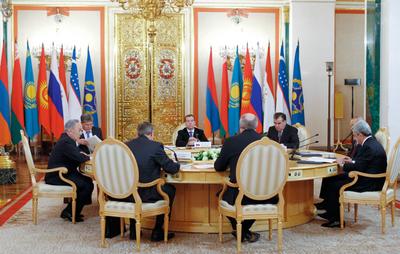Kazakhstan’s President Nursultan Nazarbaev was re-elected for a fourth consecutive term in April 2011, securing 95.5 per cent of the vote. There is little doubt that his colleague in Turkmenistan will attain similar results in a poll scheduled for 2012. Presidential elections in Tajikistan and Uzbekistan are not due until 2013 and 2014 respectively, although there are persistent rumours that the ageing Uzbek leader might step down early to pave the way for his handpicked successor.
Kyrgyzstan provided a partial exception to undemocratic politics in Central Asia, as the country elected a new president in October 2011, thus concluding a crisis precipitated by violent regime change a year and a half previously. The new head of state, Almazbek Atambaev, faced strong competition structured along sub-ethnic and regional lines. While the victory bolstered the legitimacy of Atambaev’s government, the fact that his rivals rejected the election outcome also highlighted the lack of national cohesion and the potential for clan-based conflict, which has brought down two previous regimes. The country’s internal stability will continue to be in question throughout 2012.
The creation of a customs union between Belarus, Russia and Kazakhstan was a major economic event in 2011. Kyrgyzstan will join the union in January 2012, and Tajikistan is likely to follow suit soon after. According to Nazarbaev, common customs space will lead to the economic, and ultimately political, integration of member states in a way similar to the EU — a view which is endorsed by the Russian prime minister, Vladimir Putin. Uzbekistan’s attitude toward the project on the other hand is negative: President Islam Karimov even referred to it as ‘imperialist’ in nature.
Afghanistan continued to be a major security headache for all Central Asian states in 2011. Following the announcement that NATO troops would withdraw from the country in 2014, the mood in the region turned to unbridled pessimism. The local regimes engaged in contingency planning and pre-emptive alliance-making to counter threats from the anticipated fall of the Karzai government; the resumption of an ethnic conflict in Afghanistan; and increased flows of drugs, weapons and extremist groups from the south. The rise in Islamic militancy is especially troubling for the authorities; Kazakhstan experienced its first serious terrorist attacks from jihadi groups in 2011.
Two distinct approaches have now become evident in the region in terms of strategic alignment. Kazakhstan, Kyrgyzstan and Tajikistan rely on Russia and China to underwrite their security through bilateral agreements, as well as within the framework of the Collective Security Treaty Organization and the Shanghai Cooperation Organization. Uzbekistan has opted for a dramatic rapprochement with the US instead. During her visit to Tashkent in October 2011, US Secretary of State Hillary Clinton seemed to absolve Karimov of his abysmal human rights record, and indicated that Washington again views Uzbekistan as its key strategic partner in the region. Uzbekistan is predicted to host US military bases and inherit the bulk of NATO weapons and materiel in the wake of the coalition’s departure from Afghanistan.
All five Central Asian republics celebrated the 20th anniversary of independence in 2011. The leaders’ speeches on these occasions were uniformly upbeat, detailing some real achievements over the past two decades. The most important of them is the very survival of five sovereign nation states that were emancipated suddenly and against their will in 1991. They have managed to negotiate the post-Soviet economic transition toward capitalism, and avoided interstate conflict despite numerous disputes. On the negative side, democracy deficit, weak institutions, and growing poverty and inequality (with the exception of oil-rich Kazakhstan) make Central Asia’s future uncertain. A possible crisis scenario in 2012 may feature a succession struggle in Kazakhstan or Uzbekistan following the death or incapacity of the incumbent president, a palace coup in Turkmenistan, ethnic strife in Kyrgyzstan, or hunger riots in Tajikistan. The calm of 2011 could be quite deceptive indeed.
Dr Kirill Nourzhanov is Deputy Director at the Centre for Arab and Islamic Studies, the Australian National University.
This is part of a special feature: 2011 in review and the year ahead.

